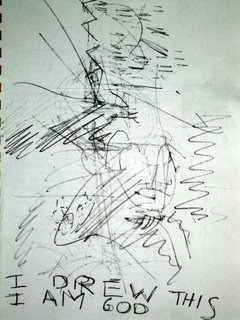“Nothing that is so, is so,” says Feste the clown in
Twelfth Night, a play about disguise, deception and duplicity. Twelfth Night is evoked in two books I have read recently. One is Michael Rosen’s
William Shakespeare, the other Darian Leader’s
Why do Women Write More Letter than they Post? Rosen’s book is an attempt to resuscitate Shakespeare from the metaphysics, the academic emphases on theme, plot, character, imagery etc, and from the nostalgic slop which stifles and mortifies his plays. Shakespeare is thus reborn as a radical poet who, while exploring concrete socio-political issues in late sixteenth century Europe, comes alive when applied to ourselves and our own unfortunate world.
Leader’s book might be described as Lacan for Idiots, except that it is an intelligent book which explains psychoanalytic concepts with reference to literature, culture and actual case-studies. Both books, in other words, take two modernist giants, dust them off the shelves, and throw them into the real world.
Rosen’s book could loosely be described as Marxist and Leader’s is unequivocally Freudian, yet both seem fascinated by the ambiguity of reality which Feste so succinctly frames. Conventional wisdom says that while Marx and Freud agree that appearances are often deceptive, Marx locates the source of this deception in economic relations, and Freud in the structure of the psyche. Or to put it another way, Karl and Sigmund are the two great therapists of the modern age, each diagnosing mankind as fundamentally alienated – in Marx’s analysis we are alienated from our fellow humans, in Freud’s we are alienated from ourselves.
I missed the Marxism 2006 plenary which asked if Freud was a reactionary or a progressive, but it seems to be a question which vexes Marxists of the classical school. There appears to be much concern that Freud is not scientific, or is not a materialist, or has even (as Adam Curtis’s film
The Century of the Self demonstrates) been a tool for capitalism. In fact, I would argue that Marx and Freud (and, why not, Shakespeare) are supreme dialecticians who recognise that “external” economic factors and “internal” psychical factors constantly reflect back on each other. They are natural bedfellows and Marxists who ignore or close their eyes to Freud put their own position in peril.
* * *

One might sum up Freudian psychoanalysis by asserting that adult life is a recovery period for the trauma of childhood. In infancy, it is established that our raison d’etre is to fall in love unconditionally with someone who reciprocates that love. The trauma occurs when we realise that the person for whom and to whom that love corresponds – our parents, or more specifically our mother – cannot possibly fulfil that role in real life. Already there is a dialectic between the psyche and the outside world: it is less the biological impossibility of a sexual or romantic union between parent and child than the social proscription (the incest taboo) that prohibits it.
The solution to this trauma lies in the postponement of the ideal love relationship. The proverbial letter-of-the-law, which is broadcast via the parental voice. should reassure us that while we cannot function as a love object for our parent (and vice-versa), an unconditional union will be possible with another person in the future. This guarantee in itself presents significant paradoxes, not least of which is the common but misguided notion that “there is somebody out there for all of us.”
The way that humans desire presents a dual conundrum. Firstly, satisfaction of a desire always lessens or even negates it. This is fundamental, and it implies that the common formula which explains why the forbidden fruit is supremely desirable is misleading. It is not the verboten nature of the fruit that makes it desirable, but rather that our desire of the fruit is what makes it forbidden. Desire, here, comes first.
The second conundrum of desire is that it is socially driven. Darian Leader neatly illustrates this via the example of the railway refreshment trolley. When one hears the rattle of the trolley coming down the aisle, one does not necessarily feel hungry or thirsty; but one is more likely to buy a coffee if one sees a fellow passenger buying one first. Desire, as Lacan says, is the desire of the other.
What this means is that the promised love-object can never absolutely materialise. For some, it does not even present itself. Not everybody finds a mate, and their desire must therefore be sublimated, or transferred onto something else: other social relationships, physical activities, intellectual pursuits, careers etc. But even for those who do find a partner, there will always be an aspect of desire which cannot be satisfied. Indeed, a surplus of desire is essential for any relationship to survive.

What we are saying here is that human desire always requires a partial dissatisfaction (which, as the word suggests, often entails considerable frustration and discomfort). Surfeit of desire is not represented by anything human, because no human is capable of representing it. Witness Truffaut’s
Day for Night, where the female lead, having been the non-requiting love object throughout the film, finally says (I paraphrase), “Ok, ok, go ahead and fuck me,” only to find that the guy cannot bring himself to fuck her. We might see his inability as pathetic, but in fact it is simply an acknowledgement that (a) no sexual act could ever match the desire he has had for her, and (b) that she, in reality, does not represent that desire.
This desire, which has (and can have) no human representation, is what Lacan calls the Phallus. The Phallus is “worldless”, except that that is actually the description Ernesto Laclau gives to capital.
Any cogent person can easily discount new-age, self-help, here-is-your-route-to-happiness books. They are born of the pressure, created partially by the pseudo-psychotherapeutic industry, to live a life of harmony. It is completely inconsistent with the Freudian therapy (if we can call it that) for our innate alienation, which is to discard the illusory notion of harmony and accept discord and conflict for what they are – unavoidable features of human existence. This is not to say that we should reject happiness, but that we should recognise that is not a given, and cannot be forced. Now, if this is not dialectical materialism, I don’t know what is.
* * *
A number of questions lead on from this, none of which I shall attempt to answer in this post. How do we proceed from the psychological to the social / political? How might we use Freud to advance Marx? If the phallus – the Real object of desire – is analogous to the notion of capital – the Real object of capitalism – how might psychoanalysis help those of us who wish to see an end to capitalism achieve our objective? Or is it just too simplistic to associate Freud and Marx in this way?
Firstly, it might be helpful to explore briefly what reality and fiction actually mean. Let’s do this by comparing sex and cybersex (this is Homo Ludens after all). Physical sex usually requires some sort of suppression – one has to keep one’s darkest desires in check. One only has to read an issue of Cosmopolitan (I wouldn’t recommend it to be honest) to see the limits of sexual fantasy that are accepted by society. But during cybersex, one can talk as filthily as one likes – your inhibitions can be left at the door. So which of these situations is the more real?
Zizek notes a similarity in the phenomenon of placid young men who play violent computer games. Is the man in question a placid young man “playing” at shooting up as many enemies as he can find, or is he actually a latently violent young man who “plays” at being docile because that is what society expects him to be? Is it conventional intercourse or dirty fantasies that maketh the man?


Social and political life differ from introspective psychological experiences because the former contain meanings only insofar as they can be articulated via language. In one’s thoughts and dreams, signifieds buzz around chaotically, often with nothing to signify them, or turn them into values that we can order and make sense of. Social life is, in other words, filtered by language. Psychoanalysis accepts psychological difficulties because it recognises there is no alternative – must politics do the same, and if not, why not?
I am struggling here to be honest, but what I am trying to tease out is precisely how two diagnoses of human alienation (shared and psychological) might lead to some sort of shared treatment. I absolutely refute the kind of Villa Road, proto-Janovian collective primal scream deal, but actually let’s ask the question anyway: what might a socio-political therapy session look like?












